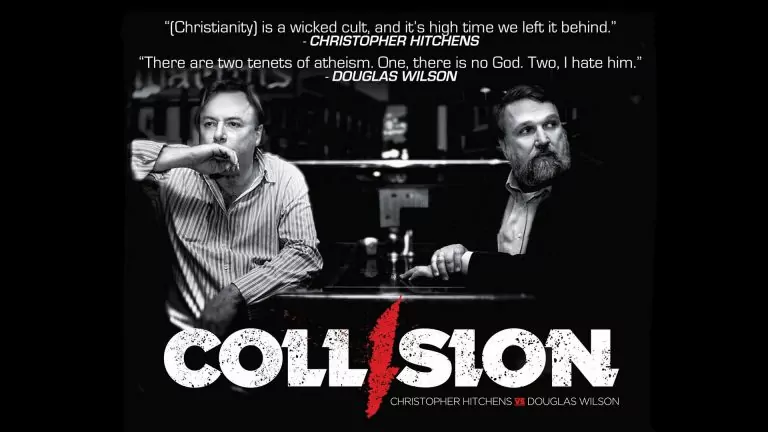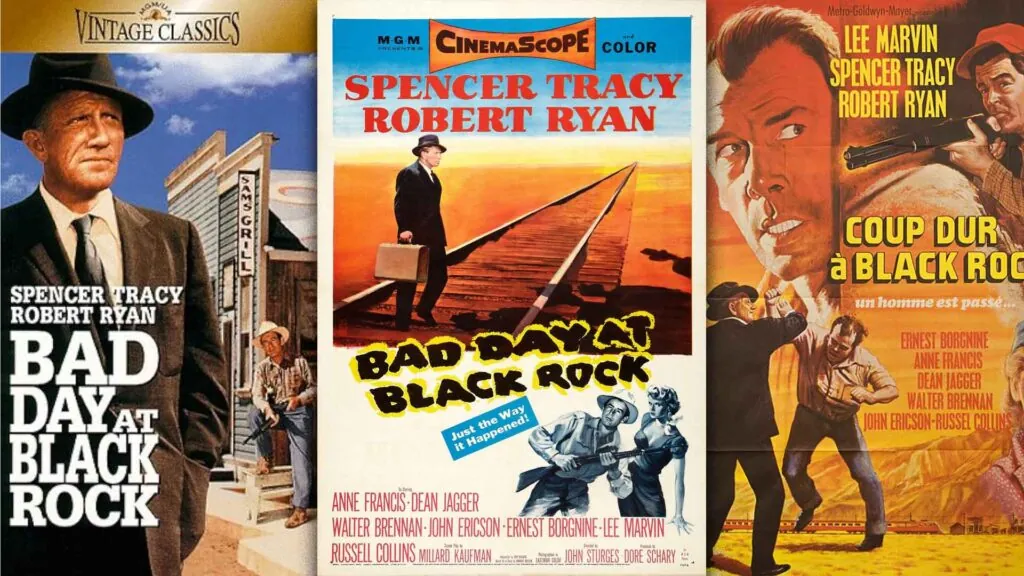Documentary
88 minutes / 2009
Rating: 9/10
The genesis of the film started back in May of 2007 when leading atheist Christopher Hitchens and Reformed pastor Douglas Wilson were asked by Christianity Today to dialogue on the question “Is Christianity good for the world?” They wrote six exchanges which were printed in the magazine and then, in 2008, compiled into a book. When the two men headed out to do an east-coast book tour, filmmaker Darren Doane tagged along. He captured their exchanges and interactions, both onstage in formal debate settings, and as they conversed over a pint of beer in the local pub. The end result is the most entertaining and enthralling debate you will ever see on film.
But its appeal is not the reason this is a must-see film. You should see Collision because:
- It prepares our children for what they’ll encounter at university. The attacks that Hitchens levels against God and Christianity are mimicked on secular campuses so Wilson’s able defense of the faith will be instructive and will be an encouragement to our young people when they face these same attacks from their professors and fellow students.
- It demonstrates the approach we need to take to answering the theistic evolutionists. How are we to understand Genesis 1-11, and what role should science take in guiding our interpretation of these chapters? To properly answer it we need to rediscover a mislaid aspect of our Reformed heritage – presuppositional apologetics. Throughout Collision Wilson brilliantly demonstrates (though doesn’t entirely explain) this distinctly Reformed way of defending the faith.
So what is apologetics? And how does presuppositional apologetics compare to the other, evidential, approach?
Despite how it sounds, apologetics isn’t about apologizing – it is about defending and arguing for God’s Truth. Evidential apologists figure if we present the evidence – enough of it, and the right sort – people will follow the facts and come to realize that there is indeed a God. The problem with this approach is that facts are always interpreted. Present someone with information about the stunning intricacy of the human eye and they’ll fall back on their worldview – their presuppositions – to tell them how to understand this information. So a Christian will look at the eye and acknowledge it as evidence of a brilliant Designer. Meanwhile, an atheist will understand it as evidence of millions of years of evolution since something this amazing couldn’t have just sprung up overnight! Confronted with the same evidence, they come to opposing conclusions. Why? Because sin taints even our intellect – even our reasoning – so evidence can be twisted to support conclusions that run right up against God’s Truth.
Presuppositional apologetics delves into the assumptions – those presuppositions – that underlie every worldview. When, in Collision, Hitchens accuses God of being a tyrant for ordering the death of the Amalekites (Deut 25:19), Wilson asks Hitchens to provide, from his atheistic worldview, a grounds for being upset. If we are just “matter in motion,” as the atheist worldview contends, what reason is there for Hitchens to care what happens to Amalekites? Hitchens makes repeated moral claims, and Wilson repeatedly shows that his atheistic worldview gives him no basis for claiming that anything is wrong or anything is right. Hitchens has debated a throng of other Christians but it’s only Wilson, and his presuppositional approach, that has given him pause.
Does that mean presuppositional apologetics is the way to go if you want to win the argument? By the film’s end, Christopher Hitchens wasn’t won over. And while Wilson was impressive, many of the atheists who watched Collision said that Hitchens won the debate. In that sense, this presuppositional approach didn’t “work.” But, of course, it is always the Holy Spirit, and not the apologist, who transforms a person’s heart.
What makes presuppositional apologetics the way to go is that it begins with the right basis, acknowledging, as Romans 1:18-32 makes clear, that this is not a battle over evidence – on some level everyone knows God exists, everyone has God’s moral law written on their hearts, and everyone is aware to some degree of how we don’t measure up. When we understand that God has already declared Himself, then we can stop wasting our time with the red herring of having to prove His existence, and we can get to the real apologetics work of clarifying and presenting His truth. Then apologetics is an opportunity to glorify God by contrasing the unshakeable biblical worldview with the unbeliever’s foundationless one.
We can learn from Wilson and use this same approach to properly answer the theistic evolutionists in Christian circles. Like Wilson, we need to cut to the very core of the debate and address their presuppositions – we need to ask how evolution can fit with Christianity when it requires a mythical Adam and Eve, millions of years of mutations and mistakes, and death before the Fall?
This is a film some will love, and others might find too loud (the producer has shot music videos in the past, and that influence is felt here in the driving, beat-y soundtrack) but the meat of what’s discussed, and the example that is set, will be valuable for all ages and all interests. Would that everyone would watch this one… and now you can, on Facebook, for free!











